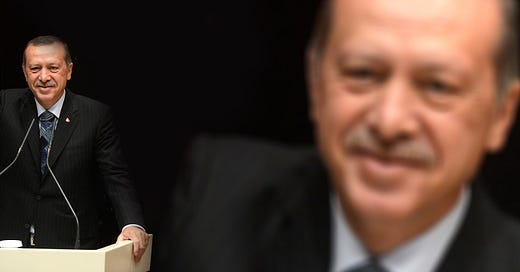Austria's Erdoğan Dilemma
The interior ministry believes the Turkish president is directly interfering in Austrian internal affairs but the foreign ministry remains in favor of a European-Turkish partnership
Servus!
“I curse the Austrian state,” Turkish president Recep Tayyip Erdoğan spat last week. He was reacting to the Austrian government’s decision to raise the Israeli flag alongside the Austrian and European ones above the chancellery and foreign ministry buildings in a sign of solidarity with the under-fire Jewish state during its latest violent escalation with Hamas. Austria, Erdoğan said, “wanted Muslims to pay the price for the genocide it had visited upon the Jews.”
Suffice it to say, the Austrian government did not take well to Erdoğan’s latest outburst. Foreign minister Alexander Schallenberg called in Turkey’s man in Vienna for a dressing down, and in a statement to the press, said Erdoğan was “foaming at the mouth” as he cursed Austria and guilty of “pouring oil on the fire” of the Israeli-Palestinian conflict instead of helping bring about a de-escalation. Turkey, in condemning Austria’s gesture of solidarity with Israel, was ultimately placing itself in opposition to democracy, the rule of law, and “civilizational values,” ÖVP MEP Lukas Mandl said.
The present state of Austro-Turkish relations can best be described as toxic, and at the heart of the matter is Erdoğan’s nakedly thuggish and authoritarian domestic and foreign policy ambitions. In his latest outburst, Erdoğan clearly framed the Israeli-Palestinian conflict not as a national conflict between the two parties over land but as a religious one between Jews and Muslims. It was an attempt to further his Islamist and Turkish nationalist political agenda at home while extending Turkish influence further into the Arab and Muslim worlds by casting himself as the champion of besieged Muslims the world over as if he were a modern-day sultan.
Erdoğan’s aggressive attitude, his cursing of Austria, was another attempt to “exert influence over the Turkish diaspora and, more broadly, European Muslim communities,” a phenomenon Lorenzo Vidino covered in Foreign Policy in 2019. “Over the last decade, Ankara has invested substantial amounts in the growth of both governmental and nongovernmental organizations to further its political agenda throughout Europe,” including through state intelligence agencies and the Millî Görüş Islamist political network. Austrian authorities filed charges against a suspected Turkish spy last September, and the interior ministry believes the Turkish secret service has tried to recruit “more than 30 Austrians detained in Turkey between 2018 and 2020 after entering the country.”
Supporters of Erdoğan and the ultra-nationalist Grey Wolves organization were a visible part of recent anti-Israel protests in Vienna. Interior minister Karl Nehammer also said last week that there is “considerable proof” of Turkish influence in nasty clashes that took place in Vienna last summer between people of Turkish and Kurdish background living in Austria. Erdoğan is in other words, in the view of the interior ministry, directly interfering in Austrian domestic politics, and caught in the middle of all this is Austria’s Turkish community—especially those who are non-aligned or oppose the Erdoğan regime. The independent Turkish Cultural Community of Austria has called for a “de-escalation of the war of words” between Vienna and Ankara.
Since Erdoğan’s post-coup attempt dictatorial turn in 2016, Austria has opposed Turkish membership of the European Union and called a formal termination of accession talks, which in any case exist in name only. And yet, all of the above notwithstanding, Vienna’s position remains in favor of “an European—Turkish neighborhood concept,” for part of the witches’ brew that is Austro-Turkish relations is that Austria needs Turkey to remain within the European orbit so that it can continue to serve as Europe’s gatekeeper on its eastern frontier, keeping refugees and other migrants out in exchange for economic and other financial inducements. Austria can’t live with Erdoğan—that much is clear—but it can’t live without him either.
Bis bald!
Thank you for signing up to the Vienna Briefing. If you know someone who would be interested in receiving this newsletter, consider sharing it with them today.
Steinacker Under Investigation
ÖVP justice spokesperson Michaela Steinacker is under investigation by anti-corruption authorities who believe her work the property management firm Raiffeisen Evolution Project Development may have constituted a concealed donation in-kind to the party. Steinacker is presumed innocent until proven otherwise.
Low Turnout
The Socialist Students of Austria, the student arm of the Social Democratic Party, won last week’s election to the Austrian National Union of Students’ federal representative body, capturing 24.6 percent of the vote and 14 seats. The liberal, non-aligned, and communist factions also saw their vote share increase. Due to the pandemic, turnout fell to an all-time low of 15.8 percent.
Failure to Launch
Austria failed to qualify for the final of this year’s Eurovision Song Contest in Rotterdam. “Amen,” sung by the former TV talent show winner Vincent Bueno, placed twelfth in the second semifinal, accumulating 66 points.






